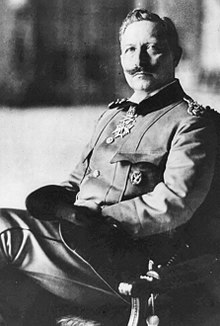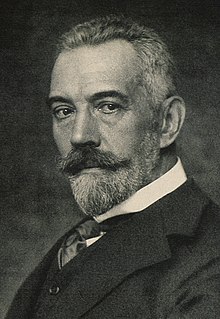Burgfriedenspolitik
[1] The informal agreement was seen as proof of Germany's national unity in waging what was presented by the imperial leadership as a defensive war.
Emperor Wilhelm II and the other parliamentary parties enthusiastically welcomed the SPD's unanimous vote in favor of war credits on 4 August 1914.
In the weeks leading up to the outbreak of hostilities, the belief that it was a defensive war was critical to ensuring support, especially among Germany's socialists.
[4] At the end of July 1914, the SPD held mass demonstrations in favour of peace and called for resistance to the impending war.
[9][10] The leaders who were present came forward and took the pledge,[4] following which the parliamentary members enthusiastically sang "Heil Dir im Siegerkranz" ("Hail to Thee in the Victor's Wreath"), the anthem of the German Empire.
[2] The Burgfrieden can be said to have begun with the Reichstag's unanimous vote on 4 August to approve the war credits for five billion marks that the government had requested.
The act authorised the Bundesrat, chaired by the chancellor, "to order such legal measures during the period of war as prove necessary to remedy economic damage".
In accordance with Article 68 of the German Constitution, the imposition of a state of war meant that freedom of the press was restricted by censorship measures anyway.
[4] The government developed the Septemberprogramm with extensive annexation goals in September 1914 when it expected that Germany would quickly win the war, but Bethmann Hollweg never spoke of it publicly.
[17] The annexationist goals discussed among the political parties were contrary to the original justification for the war as defensive and were also not in the spirit of the Burgfrieden.
Eduard Bernstein, Hugo Haase and Karl Kautsky, all in the left wing of the SPD, wrote in Das Gebot der Stunde ("The Need of the Day") in June 1915:[3]In view of all these declarations, German Social Democracy must ask itself whether it can reconcile with its principles, and with the duties incumbent upon it as the guardian of the material and moral interests of the working classes of Germany, the question of standing by those whose intentions are in the sharpest contradiction to the provisions of the declaration of our Reichstag party membership of 4 August 1914, in which we stated that, in agreement with the International, we condemn any war of conquest.
[18]By the end of the war, Burgfrieden had become an appeal to a mythical "August Experience" – the Spirit of 1914 – while in the political arena it was used as an accusation that the other side was failing to follow it.
After the anti-war faction voted against an emergency budget in early 1916, it was excluded from the SPD's parliamentary membership and formed the Socialist Working Group (Sozialistische Arbeitsgemeinschaft, SAG), which aggressively criticised the government's war policies.
In 1917 the group formally established its own party, the Independent Social Democrats (Unabhängige Sozialdemokratische Partei Deutschlands, USPD).
The Right saw it as support for the authoritarian state, while the reforms discussed by moderates and the Left centered on eliminating Prussia's three-class franchise, which weighted votes based on taxes paid and therefore favoured the wealthy.
[3] In July 1917, the Reichstag parties of the center and left formed the Inter-party Committee (Interfraktionelle Ausschuss) to discuss war policy and the post-war new orientation.
The German constitutional reforms of October 1918, which made the chancellor dependent on the confidence of the Reichstag rather than the emperor, were implemented only after the Supreme Army Command admitted that the war was lost.




